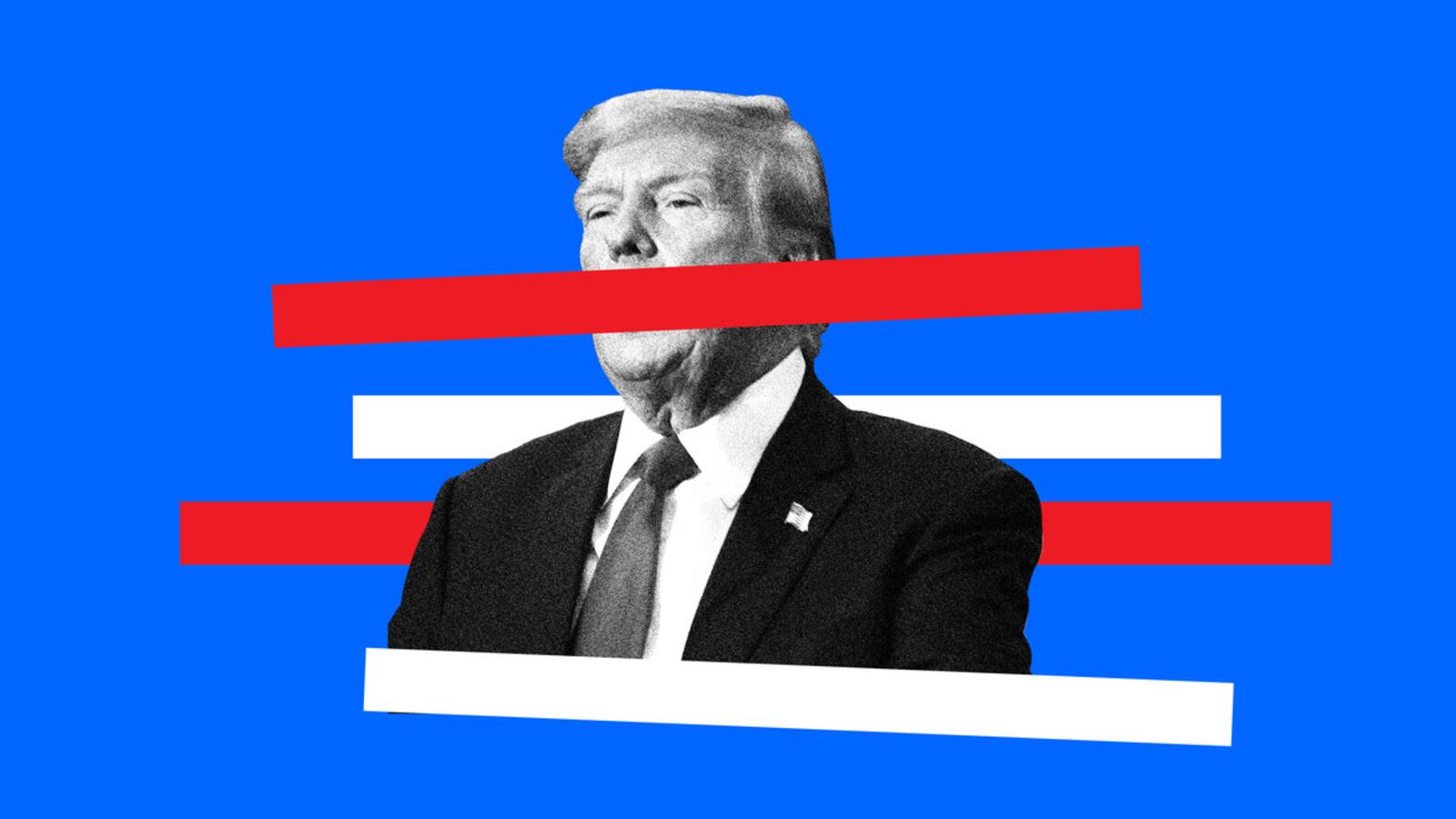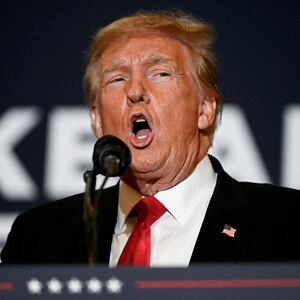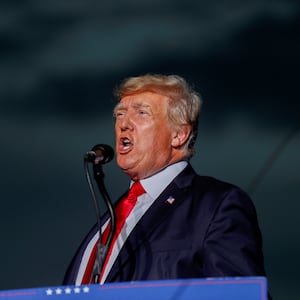For years, Donald Trump has hid behind the presidential seal—a claim of immunity that he continues to make to this day to avoid legal jeopardy. But as Trump’s cases proceed, he’s increasingly finding that the protections he was afforded as president don’t exist for a former president.
In criminal and civil cases across the country this month, judges have issued critical opinions chipping away at Trump’s attempt to shield himself. Their rulings are leaving him exposed to potential prison time and massive financial penalties, potentially ruining his 2024 re-election campaign and destroying the billionaire’s famed wealth.
And the most definitive answer could be just weeks away.
The legal maelstrom underway in the District of Columbia, Georgia, Florida, New York and elsewhere will be settled at the Supreme Court, which earlier this month agreed to review the immunity issue raised in Department of Justice Special Counsel Jack Smith’s case against the former president for his efforts to overturn the 2020 election.
The question is seemingly simple: Can an American president commit crimes while in office without ever facing criminal charges?
“It's kind of ridiculous,” said Paul Saputo, a Texas defense lawyer. “We're not even going to have a 5-4 decision. I don’t think it's going to be a close call. They realize that in order for them to really keep the country together, it's got to be pretty unanimous.”

The growing consensus by legal scholars is that the Supreme Court will lean conservative—in the traditional American sense, not a political one—starkly setting limits on executive power that will leave Trump in the cold. And that’s despite the liberal public’s concerns that Trump will benefit from the current roster at the nation’s highest court, where a third of the nine justices were appointed by the man himself.
At first glance, it would seem like the Supreme Court has little historical material with which to work. Michael Waldman, who leads the Brennan Center for Justice at New York University law school, acknowledged that there’s “not that much precedent” on issues of presidential accountability.
“There have been so few presidents as crooked as Trump,” Waldman said, noting that the Justice Department’s own policy against indicting a sitting president is completely dependent on another idea: “It’s always been assumed you can prosecute someone after-the-fact.”
The Supreme Court has a growing body of recent seminal court decisions to consider—and they’re largely related to Trump and his associates.
The most recent decision came Dec. 18, when the 11th Circuit Court of Appeals weighed in on Fulton County District Attorney Fani Willis’ massive conspiracy case against Trump and his underlings for their ploy to keep him in office after losing the 2020 election by forcing Georgia to flip its results. The three-judge appellate panel in Atlanta forcefully rejected an attempt by Trump’s White House chief of staff, Mark Meadows, to yank the case out of state court by claiming the same kind of federal immunity that protects U.S. Postal Service mail carriers.
Their 47-page opinion shredded any notion that Meadows—and by proxy, Trump—had any kind of legitimacy when they engaged in a campaign to intimidate Georgia Secretary of State Brad Raffensperger to flip 11,780 votes, spread lies about election fraud, and recruit fake electors whose shadow votes were meant to replace real ones at the Electoral College.
“Meadows cannot establish that any of these acts related to his federal office,” the panel wrote. “At bottom, whatever the chief of staff’s role with respect to state election administration, that role does not include altering valid election results in favor of a particular candidate.”
Trump was not a party in that appeal. But the man who authored that opinion, Judge William H. Pryor, Jr.—a right-wing Federalist Society member, President George W. Bush appointee, and a known “feeder” of clerks to conservative Supreme Court Justice Clarence Thomas—made it a point to broaden out his analysis in a way that would capture Trump as well.
Noting a passage in the Constitution that pertains to how a president must “take care that the laws be faithfully executed,” Pryor wrote a sweeping assessment that seemed directed at Trump.
“We are aware of no authority suggesting that the Take Care Clause empowers federal executive interference with state election procedures based solely on the federal executive’s own initiative,” he wrote.
That decision also made it clear that any conspiracy case about Trump’s attempted coup doesn’t hinge on individual acts that might seem benign in isolation, like phone calls or meetings with top officials.
“A criminal conspirator is not defined by any single actus reus in furtherance, but by his agreement to join the conspiracy,” the panel wrote.
That decision came less than a week after the 2nd Circuit Court of Appeals weighed in on journalist E. Jean Carroll’s defamation lawsuit against the former president. Trump has denied ever meeting Carroll and has called her accusations of rape a total fabrication—statements that seem glaring now that a jury has found that he sexually abused her at a New York department store in the 1990s. That case, too, tested the limits on presidential immunity, given that Trump hid behind the Justice Department for years and claimed that his public statements somehow aligned with his job description.
Although the three federal appellate judges in New York hung their decision on the fact that Trump didn’t raise the immunity defense in a timely manner, they still made it clear there were always limits.
“Presidential immunity is a defense that entitles the president to absolute immunity from damages liability for acts within the outer perimeter of his official responsibilities,” they noted.
In turn, that judgment came two weeks after the D.C. Circuit Court of Appeals ripped the shield bearing the presidential seal right out of Trump’s hands in order to expose him to a civil lawsuit brought against him by police officers injured defending the Capitol Building during the Jan. 6 insurrection. Those appellate judges pointed out how the last crooked president, Richard Nixon, forced the courts to delineate the bounds of presidential immunity—only to have Trump burst right past those barricades.
“The object of a president’s official-act immunity is to assure that he can fearlessly and impartially discharge the singularly weighty duties of the office. The president, though, does not spend every minute of every day exercising official responsibilities. And when he acts outside the functions of his office, he does not continue to enjoy immunity from damages liability just because he happens to be the president,” they wrote.
These decisions build on a Department of Justice memo, issued as part of that same case earlier this year, which clarified that federal prosecutors wouldn’t stand by a president who crosses the line. The department’s lawyers explained that Trump’s vitriolic speech on Jan. 6 was not protected by presidential immunity—nor the First Amendment.
“Such incitement of imminent private violence would not be within the outer perimeter of the Office of the President of the United States,” the DOJ wrote.
All of these ideas, in one way or another, coalesced in U.S. District Judge Tanya Chutkan’s Dec. 1 ruling that Trump was not automatically invincible to the DOJ special counsel’s 2020 coup case.
His “four-year service as commander in chief did not bestow on him the divine right of kings to evade the criminal accountability that governs his fellow citizens,” she wrote, quoting from a seminal case involving Confederate General Robert E. Lee to note that, “‘No man in this country,’ not even the former president, ‘is so high that he is above the law.’”
If the Supreme Court agrees, 2024 is open season on Trump for prosecutors and lawyers nationwide.
Waldman, who published a book this year about the rightward lurch of the nation’s highest court called The Supermajority: How the Supreme Court Divided America, told The Daily Beast that the justices can easily find a way to balance the need to have a strong president with the desire to avoid a dirty one.
“Even if the Supreme Court doesn’t want a president always looking over his back... if they want to try to draw a line, what they can say is, ‘This was not just some random act he did while in office. This was his attempt to overthrow the Constitution,” he said. “This was about the presidency. You can’t use presidential immunity... to cling to the presidency.”
But this isn’t the only case where the Supreme Court’s decision could be decisive.
On Dec. 21, an entirely different Trump legal team told the 2nd Circuit Court of Appeals in New York that they plan to ask the nation’s highest court to also determine whether Trump’s comments about Carroll were also covered.
The Supreme Court’s ultimate decision is “certain to guide the manner in which future presidents carry out their presidential duties,” they wrote.








